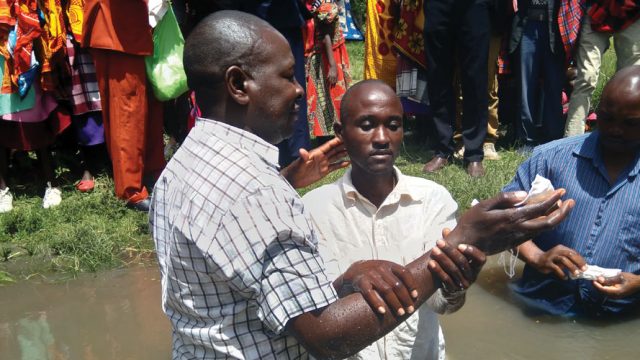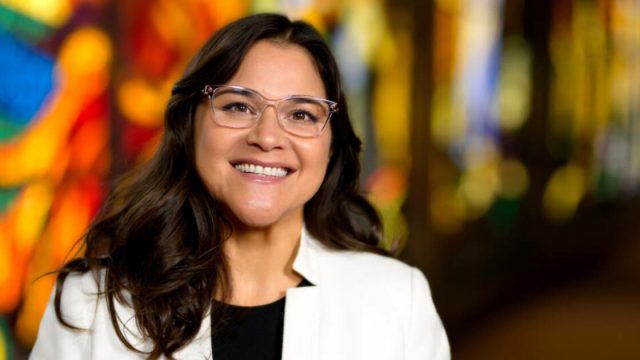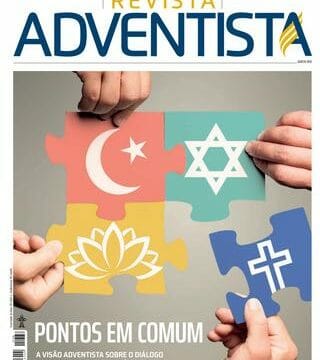Nearly 100 attendees gather at the Dirksen Senate Office Building in Washington, D.C.

The North American Division’s 18th annual Religious Liberty dinner, held recently on Capitol Hill, Washington, D.C., celebrated a central human right — the freedom of religion or belief.
The dinner brought together close to 100 religious liberty advocates, government officials, academics, Seventh-day Adventist Church leaders, Washington Adventist University Honors College students, and other guests on April 30 for a catered meal, a keynote address, and a religious liberty awards ceremony.
In his welcome, Orlan Johnson, NAD Public Affairs and Religious Liberty (PARL) director, expanded on the evening’s theme, “Championing Freedom of Conscience.” He paraphrased the words of the late Martin Luther King Jr. “Injustice for one is still injustice for all.”
Sponsored and hosted by NAD PARL and Liberty magazine, it was the NAD’s first such dinner since 2019. The event was held in the Dirksen Senate Office Building, facilitated by the participation of keynote speaker U.S. Senator Susan M. Collins.
Collins, a Maine representative, is the first Republican woman to win a fifth congressional term. Melissa Reid, NAD PARL associate director, highlighted Collins’ achievements, including “leadership in ensuring the inclusion of substantial religious freedom provisions in the 2022 Respect for Marriage Act (RMA).”
The RMA, passed in November 2022, ensures federal and state recognition of same-sex and interracial marriages. Due to concerns from Adventists and other religious freedom advocates, the RMA includes provisions addressing critical religious freedom issues.*
The RMA was codified in federal law on December 13, 2022, with strong bipartisan support in the Senate (61-36) and the House (258-169).
Reid said, “Senator Collins and her team invited everyone to the table — faith leaders, LGBTQ rights groups, civil rights groups, and religious freedom advocates — and genuinely welcomed the diversity of perspectives.”
Collins thanked the faith leaders who had formed a religious liberty coalition contributing to the RMA, stating, “You made it possible, [helping craft] what I believe are the most significant religious liberty protections enacted by Congress since the Religious Freedom Restoration Act more than 30 years ago. We did this while ensuring dignity and respect for all married couples.”
She quoted Adventist church co-founder Ellen G. White, whom she had been thrilled to discover hailed from Maine, her home state. “Every act, every deed of justice and mercy and benevolence, makes heavenly music in heaven” (Review and Herald, August 16, 1881).
“Those deeds often come at a price. At a time of deep divisions in our Congress, communities, and nation, it takes courage to stand up to criticism.” She lauded the “advocates for marriage equality and religious liberty” who “had the courage to join their voices together in harmony with [the Ellen White quote] and Abraham Lincoln’s ‘better angels of our nature,’ ” receiving a standing ovation as she ended.
Religious Liberty Champions Awarded
Several individuals were honored during the event. Alan J. Reinach, executive director and general counsel of the Church State Council, a religious liberty ministry of the Pacific Union Conference, and Todd R. McFarland, deputy general counsel to the Office of the General Counsel for the Seventh-day Adventist Church, received religious freedom jurist awards.
They were recognized for their contributions to the Supreme Court decision in favor of Gerald Groff, a USPS worker forced to choose between keeping his Sabbath or remaining employed. The Groff v. Dejoy victory overturned a nearly 50-year precedent established by the 1977 Trans World Airlines, Inc. v Hardison case, raising the de minimis (i.e., minimal) standard for employers’ obligations under Title VII of the Civil Rights Act, requiring them to make “reasonable accommodations” for employees’ religious needs.
Bettina Krause, NAD PARL associate director and Liberty magazine editor, acknowledged Reinach and McFarland “for their untiring commitment to stand in the gap and fight to represent men and women of many different faiths who’ve been forced [to choose] between their religious convictions and their employment.”
“The lesson of [the Groff] win is the importance of working together,” Reinach responded, underscoring the “weight of the evidence” of 35 friend-of-the-court briefs from a variety of faith groups filed in support of Groff.
They both acknowledged that the fight was not over. After joking that “normally, this is the type of award you get when you are close to retirement,” McFarland affirmed, “I am planning on staying around and continuing in the fight with all of you.” Reinach concurred, “Our work remains,” promising to serve a while longer and “recruit the next generation to carry on the work.”
Next, Shirley V. Hoogstra, president of the Council for Christian Colleges and Universities (CCCU) since 2014, received the religious freedom advocacy award for her longstanding commitment to protecting the religious liberty rights of faith-based institutions of higher education.
“Receiving an award from a group you love has great professional and personal significance,” Hoogstra said. A Dutch Calvinist, she praised the Seventh-day Adventist Church’s leadership in spiritual, medical, civic, legal, and educational matters. “I have learned so much from you and am better for my friendship with you. You are champions of religious freedom.”
Finally, Thomas C. Berg, James L. Oberstar Professor of Law and Public Policy at the University of St. Thomas School of Law, received the religious freedom scholar award, Krause noted, for “his three decades of outstanding scholarship in religious liberty.” She noted that his work, including Supreme Court briefs, cases represented, and books, has provided religious liberty advocates “actionable plans and actionable approaches for resolving deep conflicts in society, conflicts that [seem] insoluble.”
Berg highlighted the 1963 case of Seventh-day Adventist Adell Sherbert, whose Supreme Court victory deemed it “unconstitutional to deny her support during a time of unemployment because she declined to work on her Sabbath.” This case expanded legal rights for religious accommodation. “Her refusal was not simply a matter of choice or preference,” Berg said. “She could not work on her Sabbath without a deep injury to an essential feature of humanity, namely our capacity to seek and respond to God.”
Moving Forward — Together
An underlying theme of the night was “Stronger together.” Johnson noted that there are 1.1 million Seventh-day Adventists in the U.S., but eight million Mormons, 30 million Southern Baptists, and 90 million Catholics. “If you don’t build coalitions, you can’t survive.”
Johnson also underscored the presence of Branson Scholars, students from Washington Adventist University’s honors program, including NAD PARL interns, as a highlight in his closing remarks. “It is just unbelievable to not only be here with those who have been in the trenches but also the next generation of people who have already demonstrated their interest in this area.”
Calvin Watkins, NAD vice president, concluded the evening by asserting that “the Adventist Church is committed to religious freedom. And it makes all of us stronger when we work together.”
Watkins then prayed, “We thank You, O God, for the mighty champions here tonight. They fight for those who cannot fight for themselves, for those who do not look like them, and those who do not worship like them. We thank You, Lord, for Your power and strength. We ask that You continue to give those on the front lines the strength to run this race. And if they stumble, we ask that You would reach down, take [them] by the hand, and lead [them] on. In the name of the Almighty God, Amen.”
The original version of this story was posted on the North American Division news site.
_______________________________________
* Per an NAD statement, RMA provisions “include Congress acknowledging that ‘both traditional marriage supporters and their beliefs are decent and honorable,’ protecting churches from being [obliged] to facilitate same-sex marriages, and preventing retaliation against religious organizations for their views on marriage.”












